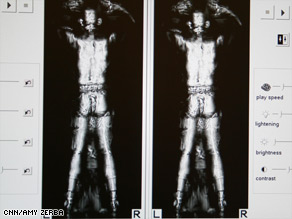Since April, Continental has installed DirecTV (DTV) on 18 planes. By early 2011, the airline plans to have 77 channels of live TV available to passengers flying domestically on about 220 of its jetliners.
It joins JetBlue (JBLU), Virgin America and Frontier in offering passengers the chance to watch live sports, news and other programming on TV screens at their seats instead of programs taped earlier.
JetBlue and Virgin America offer the TV service for free. Frontier charges $6 to all but premium-fare ticket holders and some members of its frequent-flier club. Continental is charging $6 in coach and letting first-class passengers get the service free.
Continental executives hope the offering will set it apart and attract more passengers.
"I think it does distinguish us," says Jim Compton, Continental's executive vice president of marketing, who says the carrier is offering more satellite channels than its counterparts are. "Having an industry-leading product ... will draw a better customer share to us."
Airlines are scrambling to get passengers in the midst of the economic downturn, and several carriers including United, Delta and American have begun installing Wi-Fi Internet service on their planes with the hope that the high-tech perk will lure customers back into the air.
Satellite TV has been slower to catch on, mostly because of the high cost that comes with retrofitting older planes or installing the technology on new aircraft, say satellite and airline experts.
"It's an expensive proposition," says Nate Quigley, CEO of LiveTV, the JetBlue-owned subsidiary that provides the satellite-receiving system for Continental, JetBlue and Frontier. For airlines, "The big question comes down to will it pay for itself ... with customer loyalty, in load factors?"
Installation can cost $1 million to $1.5 million a plane, Quigley says. That's in comparison with $100,000 to $250,000 for Wi-Fi capability.
And LiveTV's satellite system weighs about 1,000 pounds, driving up fuel costs at a time when oil prices are volatile. AirTran Airways opted to offer Wi-Fi rather than satellite TV in part because an entire system to provide wireless Internet capability weighs about 150 pounds.
"That's significantly less than satellite TV and all the associated equipment," AirTran spokesman Christopher White said in an e-mail. "Less weight means lower fuel costs."
Will other airlines follow?
Although many airlines may be reluctant to make a big new investment during a travel downturn, LiveTV's Quigley is hopeful they'll follow Continental's lead when the economic picture improves.
"Some CFOs may want to keep that money in the bank, on the balance sheet, in the event there's another spike in oil or an extension of the recession," he says. "I'm confident once we get through some of the volatility the industry is dealing with, and as Continental's program gets off the ground ... CFOs will be willing to get their checkbooks out again."
Airline industry observers generally agree that in a business in which players regularly match each other on fares and fees, more carriers are likely to eventually add live TV. "Let's face it, the airlines do tend to copy each other," says Bob Harrell of airline and travel consulting firm Harrell Associates. Carriers may decide it's worth the expense if they can launch a service that brings in extra money, he says.
"The airlines are collecting about $5 billion a year in ancillary fees," he says. "They're looking for any possible way to boost their revenue stream."
Whether the content is taped or live, personal TV screens will have to become more common on flights if airlines want to stay competitive, says Matthew Daimler, founder of website SeatGuru, which offers information on airlines to travelers.
In a SeatGuru survey of fliers taken March 17 to April 18, a TV screen at the passenger's seat was the in-flight entertainment offering valued most, garnering 32.4% of the vote. Only 4.4% said satellite TV was their most desired item.
"I do think that the other major airlines will need to follow Continental's lead to stay competitive and offer those types of services," Daimler says. "I don't know that it has to be a satellite TV at the end of the day, but it does have to be personal television entertainment."
Passengers who have satellite TV tend to enjoy it, Daimler says. He thinks it's a perk worth having, even if you have to pay a few dollars.
"I enjoy those screens," he says. "My coast-to-coast flights go by faster when I'm watching them."


